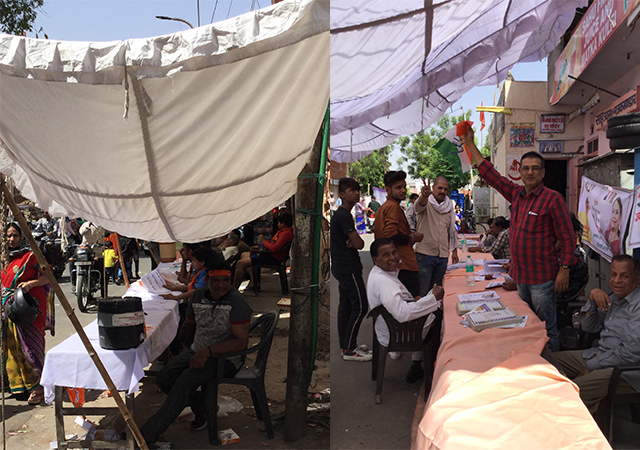 There was a nearly 64% voter turnout recorded at Rajasthan’s 51,965 polling stations. [Photos by Victoria Schofield]
There was a nearly 64% voter turnout recorded at Rajasthan’s 51,965 polling stations. [Photos by Victoria Schofield]
Polling day in the state of Rajasthan was hot. As with most states in this staggered election throughout India, the weather had already climbed to its traditional May time high with a recorded 45 degrees in the shade. Tensions between the major political parties – the ruling BJP, led by Narendra Modi, and the opposition Indian National Congress, led by Rahul Gandhi – were also high. ‘Gloves off, heat turned up’, the local Indian Express warned as the fifth phase (out of seven) began on 6 May; ‘BJP pulls out all the stops to defeat Rahul,’ was just one television headline. ‘Dry Day from 4th May after 5.00 pm till 6th May 2019 till 6 pm’ a sign in my hotel lobby informed me, signifying that ‘due to Election 2019’ no alcohol would be served to Indian nationals in the city (foreigners, of course, were exempt).
With its one billion-plus inhabitants, not surprisingly the election procedure in India, with its seven phases, is designed to inject an element of law and order into what could otherwise be a chaotic and potentially violent and fraudulent occasion. Unlike some states, for example, Bihar, whose elections were staged in seven phases, or Jammu and Kashmir which has six, voting in Rajasthan – with 41.5 million voters (out of a population of 68.5 million) – for twenty-five seats in the Lok Sabha, required only two phases. By the time I arrived in Rajasthan, the first phase had already been held in thirteen constituencies on 29 April, including Jodphur and Udaipur.
For each phase, in order to enable (and no doubt encourage) people to vote, on the day of polling a holiday was declared. Never mind that tourists who had come to visit the historic pink city of Jaipur – the state’s capital – would find that their schedule might be disrupted because all public monuments would be closed, or that two business women I encountered had flown in for business meetings which weren’t going to happen, election day took precedence. Most shops were also shut and a traditional holiday atmosphere prevailed, a couple of elephants ambling jauntily along the less congested roads, their owners eager to offer me a ride.
For weeks previously the candidates of the BJP and the opposing Congress Party had been campaigning in the sweltering heat, posters on billboards and buildings showing local faces with the familiar images of their respective party leaders slotted alongside. Like the rest of India, nationalist rhetoric by the hardline BJP against Pakistan (following the February terrorist attack in Pulwama in J&K state) and claims over the effectiveness of its ‘surgical strikes’ compared to the last Congress-led government, seemed to take precedence over issues of the environment, lack of irrigation, drinking water and development.
In the constituency of Jaipur rural, the incumbent BJP candidate – a former Olympian – Rajyawardhan Rathore – used the importance of ‘national security’ as the starting point for his election campaign, while his opponent, Krishna Poonia – another former Olympian and one of sixteen women candidates – conducted her campaign by criticising Rathore for his lack of achievement in public works. As a Jat, in a predominantly Jat community, in a country still dominated by caste, Poonia was also hoping to capitalise on the caste equation.
A mystical religious dimension was also present among the 134 candidates, with two seers, both from the BJP, contesting the seats of Sikar and Alwar. In another constituency, Dausa, both candidates from the BJP and the Congress Party were women.
As the heat began to go out of the sun and the polls closed, a nearly 64% voter turnout was being recorded at Rajasthan’s 51,965 polling stations. The question remained – would the BJP be able to emulate its 2014 success and capture all twenty-five seats or would the Congress Party, which made significant gains in the local assembly elections in December last year, make some inroads and take control of Rajasthan as it did a decade previously, when it won twenty out of twenty-five seats?
Although the results will not be known until 23 May, as elsewhere, there will be rejoicing for some, disappointment for others. ‘Congress good’, enthused a party supporter I met outside a polling station in Jaipur’s old city, whose nearby buildings were decked with BJP flags. ‘Modi good’, my taxi driver emphasised as he wove his way in and out of a still plentiful supply of rickshaws and motorcyclists on Japiur’s Gopinath Marg.
Victoria Schofield is the Chair of the Editorial Board of the Round Table.
Related stories
Indians set to judge the Modi years in greatest democratic show on earth
Fierce poll battles await India
India online: How social media will impact the 2019 Indian General Election



